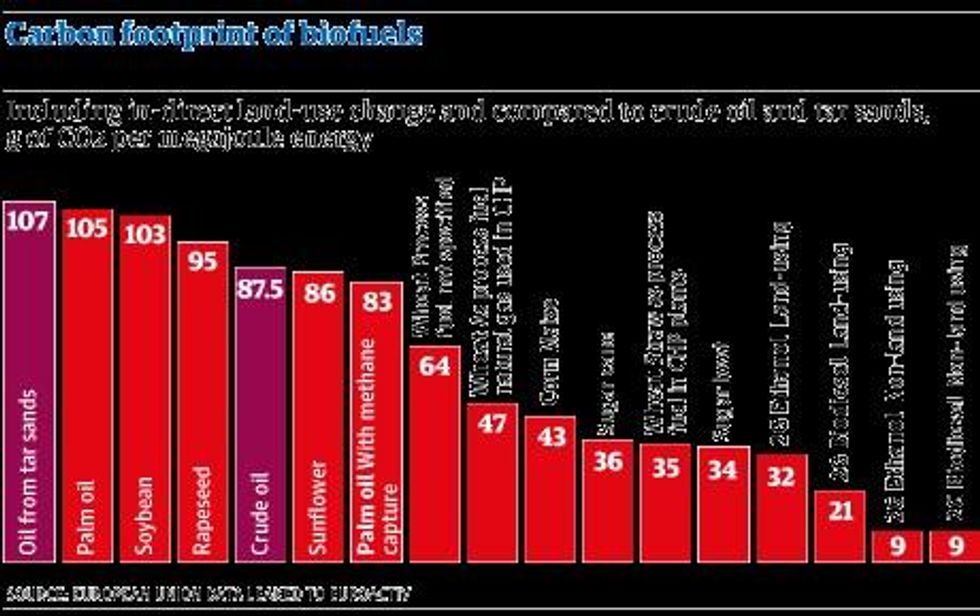Dirty Biofuels: Leaked Data Shows Some Worse Than Fossil Fuels
Palm oil and soy bean biodiesel nearly as bad as tar sands
According to leaked data from the European Commission obtained by EuroActiv, greenhouse gas emissions from some biofuels are higher than those from fossil fuels, when Indirect Land Usage Change (ILUC) is factored in.
EuroActiv reports:
ILUC happens when forests and wetlands are cleared to compensate for lands taken to grow biofuels elsewhere.
One recent report predicted that all of Malaysia's tropical peatswamp forests would be destroyed by the end of the decade because of ILUC - with alarming consequences for greenhouse gas emissions - unless the expansion of palm oil production was halted.
To measure the climate impact of fuels, Brussels favours assigning default values based on a calculation of their full lifecycle emissions, hence the debate over ILUC factors and biofuels.
In its recent review of the Fuel Quality Directive, the EU proposed a default value of 107g CO2 equivalent per megajoule of fuel (CO2/mj) for oil from tar sands, as compared to 87.5g CO2/mj for crude oil, reflecting the greater environmental harm that its production causes.
Yet while advanced 'second generation' biofuels comfortably outperform fossil fuels in the EU's new data, palm oil is ascribed a value of 105g, soybean 103g, rapeseed 95g, and sunflower 86g, once ILUC is factored in.
The Guardian has a graph reflecting the data:

The figures showing palm oil biodiesel and soybean biodiesel being almost as polluting as the tar sands deals a severe blow to the biofuels industry.
EuroActiv notes:
...industry and civil society sources described the data as credible and in line with other studies. One said it would sound a death knell for the biodiesel industry, if published.
"I think the science has proved clearly that because of the link to deforestation in places such as South East Asia, a lot of the biodiesels have significantly negative impacts on the climate," Robbie Blake, a spokesman for Friends of the Earth, told EurActiv.
The Guardian adds:
Palm oil biodiesel also received another blow on Friday, with the US Environmental Protection Agency suggesting it fails to meet the US requirement of emitting at least 20% less carbon than diesel from crude oil.
Robbie Blake, biofuels campaigner, at Friends of the Earth Europe, told me: "It's getting quite indisputable that the use of soy or palm oil to fuel our cars is even dirtier than conventional fossil fuels. Forests in Asia and South America are being destroyed by the expansion of plantations to meet the European market. It's a delusion for politicians to think that biodiesel will solve climate change."
An Urgent Message From Our Co-Founder
Dear Common Dreams reader, The U.S. is on a fast track to authoritarianism like nothing I've ever seen. Meanwhile, corporate news outlets are utterly capitulating to Trump, twisting their coverage to avoid drawing his ire while lining up to stuff cash in his pockets. That's why I believe that Common Dreams is doing the best and most consequential reporting that we've ever done. Our small but mighty team is a progressive reporting powerhouse, covering the news every day that the corporate media never will. Our mission has always been simple: To inform. To inspire. And to ignite change for the common good. Now here's the key piece that I want all our readers to understand: None of this would be possible without your financial support. That's not just some fundraising cliche. It's the absolute and literal truth. We don't accept corporate advertising and never will. We don't have a paywall because we don't think people should be blocked from critical news based on their ability to pay. Everything we do is funded by the donations of readers like you. Will you donate now to help power the nonprofit, independent reporting of Common Dreams? Thank you for being a vital member of our community. Together, we can keep independent journalism alive when it’s needed most. - Craig Brown, Co-founder |
According to leaked data from the European Commission obtained by EuroActiv, greenhouse gas emissions from some biofuels are higher than those from fossil fuels, when Indirect Land Usage Change (ILUC) is factored in.
EuroActiv reports:
ILUC happens when forests and wetlands are cleared to compensate for lands taken to grow biofuels elsewhere.
One recent report predicted that all of Malaysia's tropical peatswamp forests would be destroyed by the end of the decade because of ILUC - with alarming consequences for greenhouse gas emissions - unless the expansion of palm oil production was halted.
To measure the climate impact of fuels, Brussels favours assigning default values based on a calculation of their full lifecycle emissions, hence the debate over ILUC factors and biofuels.
In its recent review of the Fuel Quality Directive, the EU proposed a default value of 107g CO2 equivalent per megajoule of fuel (CO2/mj) for oil from tar sands, as compared to 87.5g CO2/mj for crude oil, reflecting the greater environmental harm that its production causes.
Yet while advanced 'second generation' biofuels comfortably outperform fossil fuels in the EU's new data, palm oil is ascribed a value of 105g, soybean 103g, rapeseed 95g, and sunflower 86g, once ILUC is factored in.
The Guardian has a graph reflecting the data:

The figures showing palm oil biodiesel and soybean biodiesel being almost as polluting as the tar sands deals a severe blow to the biofuels industry.
EuroActiv notes:
...industry and civil society sources described the data as credible and in line with other studies. One said it would sound a death knell for the biodiesel industry, if published.
"I think the science has proved clearly that because of the link to deforestation in places such as South East Asia, a lot of the biodiesels have significantly negative impacts on the climate," Robbie Blake, a spokesman for Friends of the Earth, told EurActiv.
The Guardian adds:
Palm oil biodiesel also received another blow on Friday, with the US Environmental Protection Agency suggesting it fails to meet the US requirement of emitting at least 20% less carbon than diesel from crude oil.
Robbie Blake, biofuels campaigner, at Friends of the Earth Europe, told me: "It's getting quite indisputable that the use of soy or palm oil to fuel our cars is even dirtier than conventional fossil fuels. Forests in Asia and South America are being destroyed by the expansion of plantations to meet the European market. It's a delusion for politicians to think that biodiesel will solve climate change."
According to leaked data from the European Commission obtained by EuroActiv, greenhouse gas emissions from some biofuels are higher than those from fossil fuels, when Indirect Land Usage Change (ILUC) is factored in.
EuroActiv reports:
ILUC happens when forests and wetlands are cleared to compensate for lands taken to grow biofuels elsewhere.
One recent report predicted that all of Malaysia's tropical peatswamp forests would be destroyed by the end of the decade because of ILUC - with alarming consequences for greenhouse gas emissions - unless the expansion of palm oil production was halted.
To measure the climate impact of fuels, Brussels favours assigning default values based on a calculation of their full lifecycle emissions, hence the debate over ILUC factors and biofuels.
In its recent review of the Fuel Quality Directive, the EU proposed a default value of 107g CO2 equivalent per megajoule of fuel (CO2/mj) for oil from tar sands, as compared to 87.5g CO2/mj for crude oil, reflecting the greater environmental harm that its production causes.
Yet while advanced 'second generation' biofuels comfortably outperform fossil fuels in the EU's new data, palm oil is ascribed a value of 105g, soybean 103g, rapeseed 95g, and sunflower 86g, once ILUC is factored in.
The Guardian has a graph reflecting the data:

The figures showing palm oil biodiesel and soybean biodiesel being almost as polluting as the tar sands deals a severe blow to the biofuels industry.
EuroActiv notes:
...industry and civil society sources described the data as credible and in line with other studies. One said it would sound a death knell for the biodiesel industry, if published.
"I think the science has proved clearly that because of the link to deforestation in places such as South East Asia, a lot of the biodiesels have significantly negative impacts on the climate," Robbie Blake, a spokesman for Friends of the Earth, told EurActiv.
The Guardian adds:
Palm oil biodiesel also received another blow on Friday, with the US Environmental Protection Agency suggesting it fails to meet the US requirement of emitting at least 20% less carbon than diesel from crude oil.
Robbie Blake, biofuels campaigner, at Friends of the Earth Europe, told me: "It's getting quite indisputable that the use of soy or palm oil to fuel our cars is even dirtier than conventional fossil fuels. Forests in Asia and South America are being destroyed by the expansion of plantations to meet the European market. It's a delusion for politicians to think that biodiesel will solve climate change."


